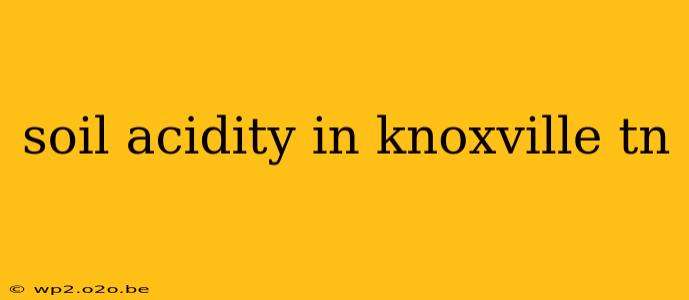Knoxville, Tennessee, boasts a diverse landscape, from the rolling hills to the urban sprawl, but one common factor underlies much of its gardening and landscaping success: soil pH. Understanding soil acidity (low pH) in Knoxville is crucial for thriving plants and a healthy lawn. This comprehensive guide will explore the nuances of soil pH in our region, offering practical solutions for testing, adjusting, and maintaining optimal conditions.
What is Soil Acidity and Why Does it Matter?
Soil acidity refers to the level of hydrogen ions (H+) in the soil. It's measured on a scale of 0 to 14, with 7 being neutral. A pH below 7 indicates acidity, while above 7 indicates alkalinity. Most plants prefer a slightly acidic to neutral pH range (6.0-7.0), although some plants thrive in more acidic or alkaline conditions. In Knoxville, many soils tend towards slightly acidic conditions due to the region's geological history and rainfall patterns.
Why is soil pH so important? Because it directly impacts nutrient availability. At low pH levels, essential nutrients like phosphorus, potassium, and molybdenum become less available to plants, hindering growth and potentially leading to nutrient deficiencies. Conversely, at high pH levels, other nutrients like iron and manganese can become less accessible. Furthermore, extreme acidity can affect soil structure and microbial life, impacting overall soil health.
Identifying Acidity Problems in Your Knoxville Garden or Lawn
The telltale signs of acidic soil can vary depending on the severity. Look for these symptoms:
- Stunted plant growth: This is a common indicator that plants aren't accessing essential nutrients.
- Chlorosis (yellowing of leaves): Particularly between leaf veins, often indicating iron deficiency, a common problem in acidic soils.
- Poor flowering or fruiting: Acidic soil can impair the reproductive processes of plants.
- Mottled or patchy lawn: Uneven growth in your lawn can be a sign of nutrient imbalance due to soil acidity.
- Soil compaction: Highly acidic soils may lose their structure and become compacted.
Testing Your Soil pH in Knoxville
Before taking action, you must accurately determine your soil's pH. This can be done in several ways:
- Home soil testing kits: These are readily available at most garden centers and provide a quick and relatively inexpensive method for testing.
- Professional soil testing: The University of Tennessee Extension offers soil testing services which provide a more in-depth analysis, including nutrient levels in addition to pH. This offers a more comprehensive understanding of your soil's health. Their recommendations are tailored specifically to the Knoxville area and its unique soil characteristics. Contact your local county extension office for details.
Adjusting Soil pH in Knoxville: Lime and Other Amendments
If your soil test reveals acidity, you can amend it to raise the pH. The most common method is to add agricultural lime. Lime is a naturally occurring calcium carbonate that neutralizes acidity. The amount of lime needed depends on the severity of the acidity and your soil type. Always follow the recommendations provided by your soil test or the University of Tennessee Extension.
Other amendments can also help improve soil health and indirectly influence pH:
- Compost: Improves soil structure, aeration, and nutrient retention.
- Organic matter: Adds nutrients and helps buffer pH changes.
Important Note: Raising soil pH is a gradual process. Don't expect immediate results. It may take several months or even a year to see significant changes. Regular testing and adjustments are essential.
Maintaining Optimal Soil pH in Knoxville
Once you've adjusted your soil pH to the ideal range, maintaining it is crucial. Here are some tips:
- Regular soil testing: Conduct soil tests annually or biennially to monitor pH levels.
- Adding organic matter: This helps buffer against pH fluctuations.
- Appropriate fertilization: Use fertilizers that are appropriate for your soil's pH and the plants you're growing.
By understanding the importance of soil pH, utilizing accurate testing methods, and employing appropriate amendment strategies, Knoxville gardeners and landscapers can cultivate vibrant, healthy plants and lawns year after year. Remember to consult with your local University of Tennessee Extension office for region-specific advice and support.

